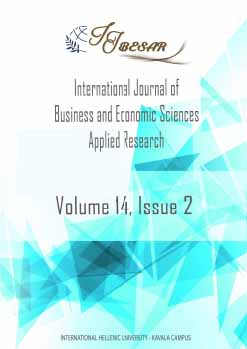Index of the Cycle of Money - The Case of Greece
Index of the Cycle of Money - The Case of Greece
Author(s): Constantinos ChalloumisSubject(s): Economy, Financial Markets
Published by: Τεχνολογικό Εκπαιδευτικό Ίδρυμα Ανατολικής Μακεδονίας και Θράκης
Keywords: Index of the cycle of money; Greece; the cycle of money;
Summary/Abstract: Purpose: The purpose of this paper is to apply the theory of cycle of money in the case of Greece. Prior works have determined the economic characteristics of the case of Latvia, Serbia, and Bulgaria, according to the concept of the theory of cycle of money. The index of the cycle of money suggests how an economic system should counteract a monetary and fiscal crisis and studies how well-structured is Greece’s economy. The estimations of the index of the cycle of money of Greece are compared with the global average index of the cycle of money. The results reveal that Greece is above the average global value. Then, Greece’s results reveal that it is a well-structured economy and can face an economic crisis. The current work is important as represents the strength of Greece’s economy with emphasis to the period of 2012 - 2017, of financial and economic crisis. The theory of the cycle of money covers the gap that exists for the structure and functionality of the economy, which formed on the derivative of GDP, giving the cycle of money. Moreover, it is the only theory that enhances the economy, without any negative effect of the fiscal or the monetary policy, as uses the same amount of money of an economy appropriately.
Journal: International Journal of Business and Economic Sciences Applied Research (IJBESAR)
- Issue Year: 14/2021
- Issue No: 2
- Page Range: 58-67
- Page Count: 10
- Language: English

